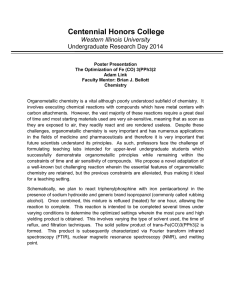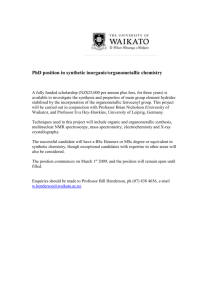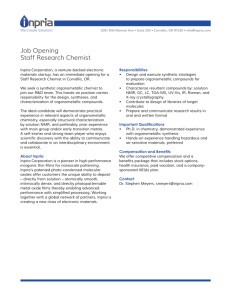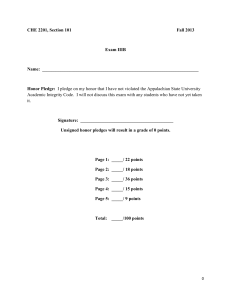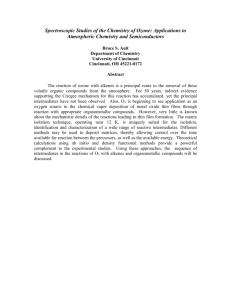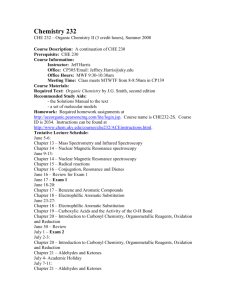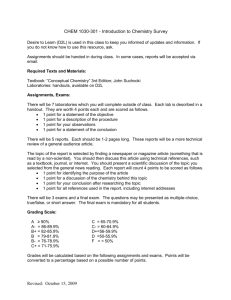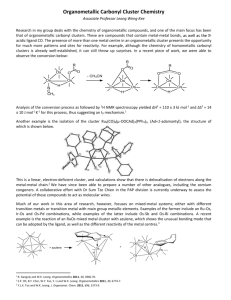CHEM 4430 SYLLABUS - Kennesaw State University
advertisement
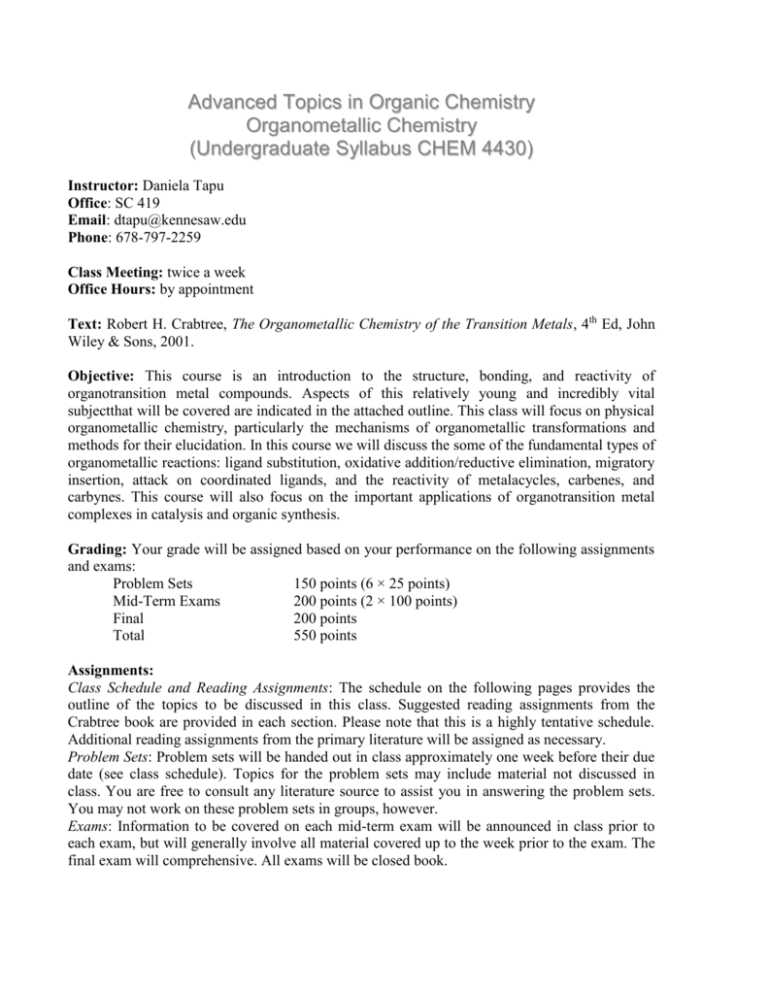
Advanced Topics in Organic Chemistry Organometallic Chemistry (Undergraduate Syllabus CHEM 4430) Instructor: Daniela Tapu Office: SC 419 Email: dtapu@kennesaw.edu Phone: 678-797-2259 Class Meeting: twice a week Office Hours: by appointment Text: Robert H. Crabtree, The Organometallic Chemistry of the Transition Metals, 4th Ed, John Wiley & Sons, 2001. Objective: This course is an introduction to the structure, bonding, and reactivity of organotransition metal compounds. Aspects of this relatively young and incredibly vital subjectthat will be covered are indicated in the attached outline. This class will focus on physical organometallic chemistry, particularly the mechanisms of organometallic transformations and methods for their elucidation. In this course we will discuss the some of the fundamental types of organometallic reactions: ligand substitution, oxidative addition/reductive elimination, migratory insertion, attack on coordinated ligands, and the reactivity of metalacycles, carbenes, and carbynes. This course will also focus on the important applications of organotransition metal complexes in catalysis and organic synthesis. Grading: Your grade will be assigned based on your performance on the following assignments and exams: Problem Sets 150 points (6 × 25 points) Mid-Term Exams 200 points (2 × 100 points) Final 200 points Total 550 points Assignments: Class Schedule and Reading Assignments: The schedule on the following pages provides the outline of the topics to be discussed in this class. Suggested reading assignments from the Crabtree book are provided in each section. Please note that this is a highly tentative schedule. Additional reading assignments from the primary literature will be assigned as necessary. Problem Sets: Problem sets will be handed out in class approximately one week before their due date (see class schedule). Topics for the problem sets may include material not discussed in class. You are free to consult any literature source to assist you in answering the problem sets. You may not work on these problem sets in groups, however. Exams: Information to be covered on each mid-term exam will be announced in class prior to each exam, but will generally involve all material covered up to the week prior to the exam. The final exam will comprehensive. All exams will be closed book. Class Notes: Detailed outlines of the class notes will be available from the class web site prior to class meetings. Integrity: Every KSU student is responsible for upholding the provisions of the Student Code of Conduct, as published in the Undergraduate Catalog. Section II of the Student Code of Conduct addresses the University’s policy on academic honesty, including provisions regarding plagiarism and cheating, unauthorized access to University materials, misrepresentation / falsification of University records or academic work, malicious removal, retention, or destruction of library materials, malicious / intentional misuse of computer facilities and / or services, and misuse of student identification cards. Incidents of alleged academic misconduct will be handled through the established procedures of the University Judiciary Program, which includes either an “informal” resolution by a faculty member, resulting in a grade adjustment, or a formal hearing procedure, which may subject a student to the Code of Conduct’s minimum one semester suspension requirement. Suspicious behavior can get you in trouble. Keep your eyes on your own paper during Quizzes and Exams. Be careful to prevent other students from seeing your paper during Exams. Non-medical electronic devices may not be used during a quiz or exam. COURSE OUTLINE 1. Introduction--Structure and Bonding 2. Oxidation state and the 18 electron rule 3. Survey of ligands 4. Physical Methods in Organometallic Chemistry 5. Ligand Substitution 6. Oxidative Addition I - Non-Polar Reagents 7. Oxidative Addition II - Polar Reagents 8. Cross-Coupling Reactions Crabtree 9. C-H Activation and Functionalization 10. Migratory Insertion 11. Carbonylation 12. Hydrogenation 13. Hydroformylation 14. Coordination Polymerization of Olefins 15. Carbenes and Carbynes 16. Olefin Metathesis 17. Ligand Centered Reactions 18. Organometallic Oxidation Catalysts
